Gas Forge Supplies for Efficient Blacksmithing
Abana Chapter
February 19, 2024
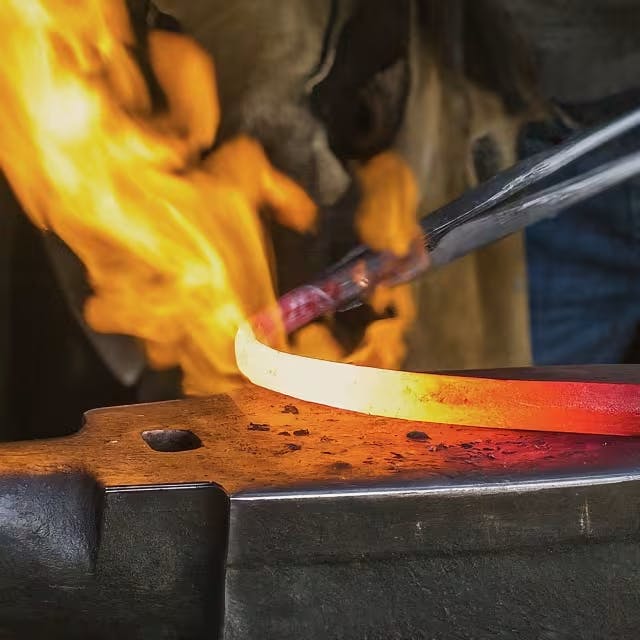
Navigating the world of blacksmithing supplies can be a daunting task, especially when deciding on the most efficient equipment for your forging needs. Gas forges have become increasingly popular for their convenience and cleanliness, despite being somewhat noisier and warmer for the workspace. This guide zeroes in on essential gas forge supplies for efficient blacksmithing, offering insights into everything from choosing the right propane burner to ensuring your forge is properly insulated and safe. Whether you're a beginner or looking to optimize your current setup, understanding the nuances of gas forge supplies is key to mastering the art of blacksmithing.
Key Takeaways
Beginners should prioritize acquiring the essential gas forge supplies to start their blacksmithing journey effectively.
Selecting the appropriate propane burner is crucial for achieving the optimal balance between heat output and fuel efficiency.
Proper insulation in gas forges is key to maintaining consistent temperatures and ensuring the longevity of the forge.
Safety equipment is non-negotiable for blacksmiths working with gas forges to prevent accidents and injuries.
Optimizing a gas forge setup can significantly enhance efficiency and productivity in blacksmithing projects.
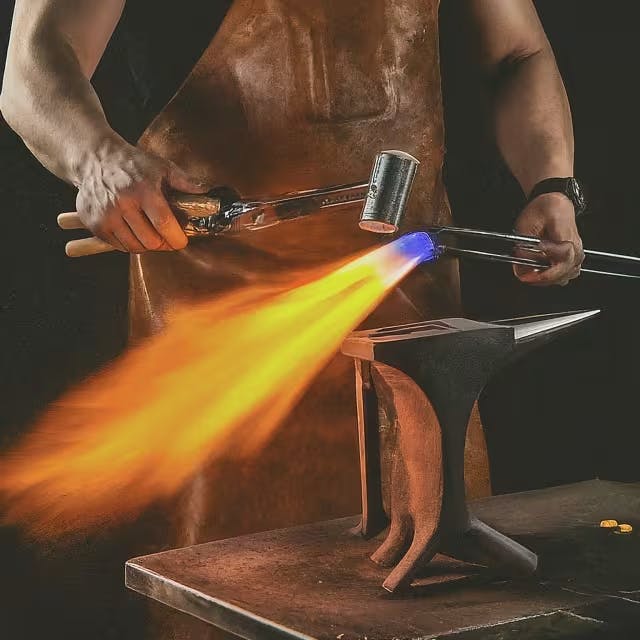
Essential Gas Forge Supplies for Beginners
Starting your journey into blacksmithing with a gas forge can be exciting. However, to set the stage for success, having the right gas forge supplies is crucial. A basic understanding of the necessary equipment not only ensures efficiency but also safety.
Propane Burner: The heart of a gas forge, necessary for heating metal. Ensure it's designed for a gas forge for optimal performance.
Regulator with a Pressure Gauge: This controls the flow of gas to your burner, crucial for maintaining the desired temperature.
Refractory Materials: To line the interior of your forge, these materials protect the forge shell and help retain heat. Options include ceramic fiber blanket, fire bricks, or castable refractory cement.
Forge Body: While many opt for a commercially available gas forge, a DIY forge can be made from steel tanks or pipes.
Safety Gear: Safety cannot be overstressed. High-quality gloves, eye protection, and a fire extinguisher are non-negotiable components of your toolkit.
Proper Ventilation: Ensure your workspace is equipped with adequate ventilation to safely remove forge gases.
Diving into forge work requires a commitment to learning and safety. For those looking to expand their toolkit further, exploring additional forge supplies can provide insights into tools and materials that support skill development. Additionally, considering the type of projects you intend to tackle can guide you in choosing between gas, coal, or wood-fired forges, each offering its unique advantages.
Remember, the right supplies not only make your blacksmithing journey safer but also more enjoyable, allowing you to focus on mastering your craft.
Choosing the Right Propane Burner for Your Forge
When venturing into the realm of efficient blacksmithing, selecting a high-quality propane burner is pivotal. These burners are the heart of gas forges, offering both consistency and control over the heat necessary for metalwork. However, with diverse models available, zeroing in on the perfect match requires understanding key attributes that impact performance.
Key Attributes to Consider:
BTU Output: The British Thermal Unit (BTU) rating indicates the energy output and thus the heat generated by the burner. For forging, a burner with a high BTU output ensures quick heating and the ability to reach forging temperatures efficiently.
Fuel Efficiency: Seeking a propane burner that balances high heat output with minimal fuel consumption is crucial. Efficient burners reduce operational costs over time, making them a smart investment.
Build Quality: Durability is non-negotiable. Opt for burners crafted from high-grade materials resistant to the rigors of frequent heating and cooling cycles.
Ease of Use: Especially for beginners, a burner that's straightforward to operate ensures a smoother forging experience. Features like adjustable controls for flame size and heat output can significantly influence usability.
For those considering alternatives to propane, exploring reliable coal and coke forges might uncover options that align more closely with different blacksmithing requirements.
Additionally, no forge is complete without the proper tools. Whether it's hammers, tongs, or anvils, finding top-quality blacksmith supplies online is a step towards ensuring that every project is not just possible but also a pleasure to undertake.
In essence, choosing the right propane burner is a blend of assessing your forging needs, understanding the burner's specifications, and considering how it complements the rest of your setup. This thoughtful approach ensures not only the efficiency of your blacksmithing projects but also the joy and satisfaction derived from the craft.
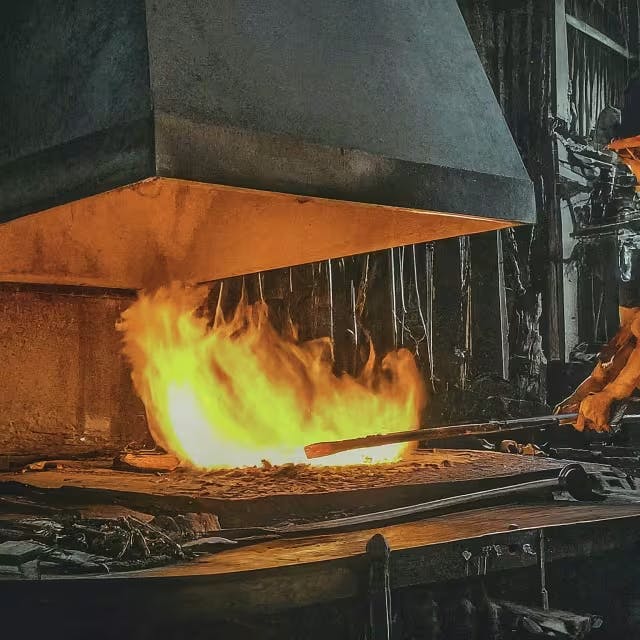
The Importance of Proper Insulation in Gas Forges
Choosing the right kind of insulation for your gas forge isn't just about maintaining temperature; it's about efficiency, safety, and the longevity of your forge. A well-insulated forge preserves heat, meaning less fuel consumption and more time forging. This not only saves money but reduces the stress on the forge's frame, prolonging its life.
Key Insulation Types:
Ceramic Fiber Blanket: Light, efficient, and easy to shape. Offers excellent heat retention, making it a popular choice among blacksmiths.
Refractory Cement: Provides a solid, durable lining for areas exposed to high temperatures. It's ideal for areas that require more structural integrity.
Rigidized Ceramic Fiber Boards: Combine the lightweight and thermal efficiency of ceramic fiber with added durability. They don’t sag or slump, ensuring a uniform insulation layer.
Effective insulation also means a safer work environment; it significantly reduces the exterior temperature of the forge, lowering the risk of accidental burns. For further insights on creating a safe and efficient workspace, consider exploring the essentials of blacksmithing safety.
With numerous options available, selecting the right materials can seem daunting. Yet, taking the time to research and choose wisely pays off by enhancing your forging capabilities and overall satisfaction. For those seeking more detailed guidance on setting up their forging space, a deep dive into how to choose the right gas forge can offer valuable insights and tips.
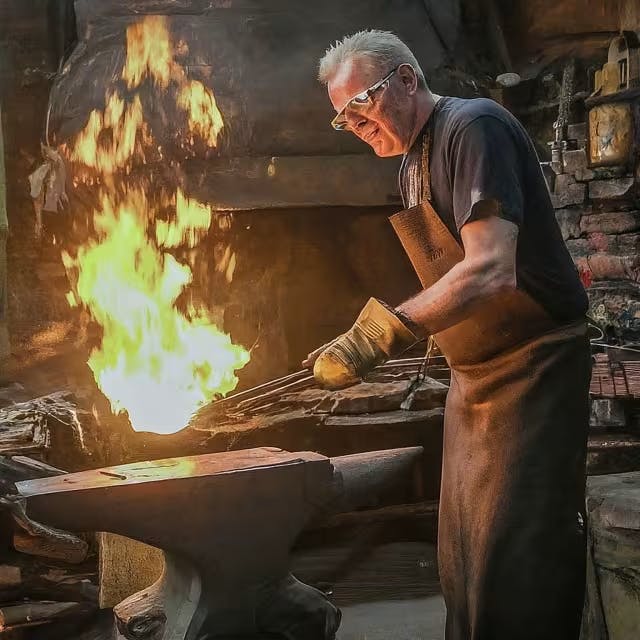
Gas Forge Safety Equipment: A Must-Have for Blacksmiths
When diving into the world of blacksmithing, safety should always come first. A comprehensive understanding of the proper safety equipment is vital to protect yourself from the inherent risks of working with a gas forge. High temperatures, sparks, and metal fragments can pose serious hazards, making the right protective gear crucial.
For starters, a pair of high-quality gloves designed for high-heat resistance is non-negotiable. Not only do they shield your hands from burns, but they also provide a better grip on your tools, ensuring precision work. Eye protection cannot be overlooked; safety goggles or face shields protect against flying debris and intense light.
Respiratory safety is another critical aspect often disregarded. A well-fitted respirator guards against inhaling harmful fumes and particulate matter generated during the forging process. Investing in ear protection is wise, too; prolonged exposure to the noise in a blacksmith's workshop can impact hearing over time.
Lastly, foot protection should not be ignored. Robust shoes or boots can prevent injuries from falling objects and hot splashes. For comprehensive guidance on selecting the right gear, take a look at this detailed overview on essential protective gear for metalwork safety.
Blacksmithing is a rewarding craft, but it demands respect for the risks involved. Equipping yourself with the appropriate safety gear ensures you enjoy crafting without compromising your well-being.
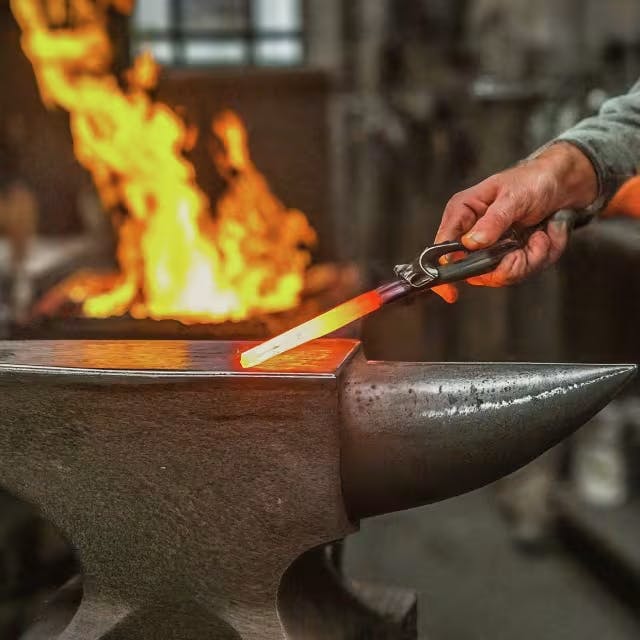
Optimizing Your Gas Forge Setup for Maximum Efficiency
When setting up a gas forge, selecting the right supplies is crucial for effective and efficient blacksmithing. One key consideration is the type of fuel you use. Propane is a popular choice due to its availability and the clean burn it provides. However, ensuring you have a reliable regulator and hose setup can make a significant difference in managing gas flow and achieving the desired temperatures consistently.
Another essential supply is a high-quality refractory material. This material lines the interior of your forge, protecting it from the intense heat generated during blacksmithing tasks. A durable refractory material not only extends the lifespan of your forge but also improves heat retention, which can lead to more efficient fuel use.
The choice of forge burner is also critical. A well-designed burner can offer greater control over the forge atmosphere, which is particularly important when working with different types of metals. For those looking to maximize efficiency, investing in a burner that allows for easy adjustment and delivers a steady, even heat is advisable.
Incorporating a reliable system for monitoring temperature is another step towards optimizing your gas forge setup. A digital or analog pyrometer can provide accurate readings, helping you maintain the right temperature for various blacksmithing processes.
For those interested in ensuring their tools are as reliable as their forge, finding the right tools is just as important. Discovering the best tom tongs for your projects can make handling materials much easier and more precise, complementing your efficient forge setup.
By carefully selecting your gas forge supplies and paying attention to these details, you can create a setup that not only meets your blacksmithing needs but also does so in a more efficient and effective manner. This not only saves time but can also reduce costs over the long term, making your blacksmithing hobby or business more sustainable. To ensure a successful blacksmithing experience with your gas forge, it is vital to select the right supplies focusing on safety, efficiency, and durability. From the choice of propane burner and refractory materials to personal protective equipment and proper forge insulation, each component plays a crucial role in optimizing blacksmithing projects. By prioritizing these aspects in your setup, you will achieve not only maximum efficiency but also enjoy a safer, more sustainable forging practice.
Frequently Asked Questions
What are the essential gas forge supplies for beginners in blacksmithing?
For beginners in blacksmithing using a gas forge, essential supplies include a propane burner, a regulator with a pressure gauge, refractory materials to line the forge, a properly sized forge body, necessary safety gear (such as high-quality gloves, eye protection, and a fire extinguisher), and adequate ventilation for the workspace. These components are crucial for efficiency, safety, and enhancing the overall forging experience.
How can choosing the right propane burner affect the efficiency of your gas forge?
Choosing the right propane burner influences the efficiency of your gas forge by enabling consistent and controlled heating, essential for metalwork. The burner's BTU output determines the heat generated, indicating how quickly and effectively a forging temperature can be reached. Opting for a fuel-efficient model minimizes operational costs, while a burner constructed from high-quality materials ensures durability against frequent temperature changes. Features like adjustable controls can enhance usability, making the forging process smoother and more enjoyable.
What types of refractory materials are best for insulating a gas forge, and why?
The best types of refractory materials for insulating a gas forge include:
Ceramic Fiber Blanket: This material offers excellent heat retention and flexibility, making it a popular choice for insulating forges.
Refractory Cement: It's ideal for areas requiring structural integrity, providing a durable lining resistant to high temperatures.
Rigidized Ceramic Fiber Boards: These boards combine the insulation properties of ceramic fiber with added durability, ensuring a uniform layer that doesn’t sag over time.
These materials safeguard the forge's shell, enhance heat retention, and contribute to a safer, more efficient forging process.
Why is safety gear crucial in gas forge blacksmithing, and what should be included?
Safety gear is essential in gas forge blacksmithing to protect against high temperatures, sparks, and metal fragments. Essential safety items include high-heat resistant gloves, safety goggles or face shields for eye protection, a well-fitted respirator to guard against inhaling harmful fumes, ear protection to prevent hearing damage from continuous loud noise, and robust shoes or boots to protect feet from falling objects and hot materials. These protective measures ensure a safer forging experience, allowing for focus on craftsmanship while minimizing the risk of injury.
How do regulator and hose setups impact the performance of a gas forge?
The performance of a gas forge is significantly influenced by the regulator and hose setups as they determine the flow and pressure of gas reaching the burner, affecting both temperature control and fuel efficiency. High-quality regulators with pressure gauges allow for precise adjustments, supporting optimal forge conditions for various blacksmithing tasks. Properly rated hoses ensure safe gas delivery without leaks. Together, these components play a crucial role in achieving the desired heat efficiently, safely, and consistently, essential for effective metalworking.
What considerations should be made when selecting a burner for your gas forge to ensure metalwork precision?
When selecting a burner for your gas forge, prioritize BTU output for energy efficiency and heating capability, fuel efficiency to minimize operational costs, and build quality for durability against frequent temperature changes. Additionally, ease of use and adjustability are key for beginners to achieve desired temperature control. Consideration of these factors ensures effective and efficient metalwork with each project.


